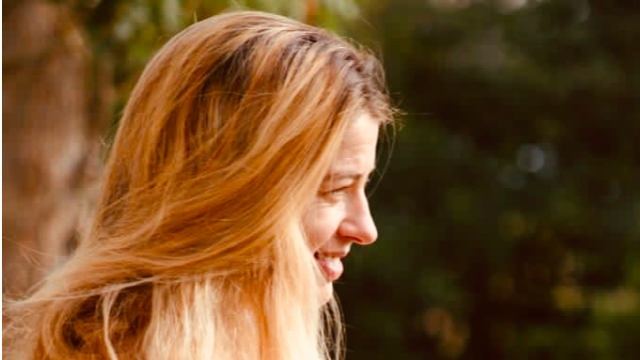Céline Imart (M05), who took over the family grain business following a career in finance, cultivates her left-field vision of modern farming, against the backdrop of globalisation and the environmental transition.
Céline Imart wasn’t supposed to end up a farmer. Far from it! After Sciences Po Paris and a Master in Strategy & Management of International Business (SMIB) at ESSEC, she jetted off to South America to work as a finance manager for Bolloré Chile, and then moved to Paris, where she worked as a consultant for PwC. Things just fell into place when her father announced that he was ready for retirement. “All of a sudden, it just seemed impossible that I wouldn’t take over from him. It wasn’t a rational decision, but a cry from the heart.” And so, she became the sixth generation to run the family business.
Farming School
It was a very sudden change.“I had to return to an isolated rural environment, beautiful but harsh. I saw a drastic fall in income. And handing over a family business isn’t as straightforward as moving between roles in a company, because emotions come into play.”
She had a lot to learn. “The bulk of the job is agronomics. We spend a lot of time observing the land, touring the plots, and monitoring the fields alongside the technicians. It requires a lot of patience and a lot of humility.” Céline needed to get to know both nature and farming machinery. “You need to know how to weld, how to grind, to get your hands dirty.”
And learning the basics wasn’t enough. “Knowledge and the tools we use are constantly evolving. Today I have mapping software to assess how much nitrogen is in my seedlings, guidance systems split into sections to manage my inputs, and sensors and probes to optimise irrigation of my fields... So many systems that were still in their infancy when I started this job.” This means that Céline Imart is always learning on the job. “Fortunately, in France we have a network of chambers of agriculture, technical institutes, and regional initiatives that are the envy of the world. We share information and run regional trials to compare what we can. We make full use of our collective intelligence.”
And you might not think it, but the skills she picked up at business school and in the world of work have their uses here, too. “Managing a farm means knowing how investments work, how to contractualise business relationships, optimise costs, and recruit labour... Not to mention the regulatory and paperwork side of things.”
An Integrated Approach
Céline Imart practices integrated farming. “My philosophy: to use the best existing solution for my land. I’m just as likely to use natural manure as I am chemical fertilizer if that means that I just have to spread once instead of three times, which is definitely better for my carbon footprint. I’m very open-minded... Another example: to protect my rapeseed, I plant an earlier-blooming variety around the edges of the field, so that the parasites are already well-fed when the rest open up. But if gentle solutions don’t work, I use pesticides. Because if my harvest is destroyed, France will need to import to compensate for it, from countries on the other side of the world, where production conditions are less well-regulated, meaning even worse consequences for the environment.”
On the Battlefield
Céline Imart isn’t shy about pointing out the inconsistencies in globalised farming. “The European Union has banned the production of GMO crops, but not their import. The result? Not only are our producers prevented from competing on a level playing field, but customers are finding GMO foods on their plates. If we really wanted to protect our market, we would subject our trading partners to the same restrictions we do ourselves. Otherwise, the end result is an outsourcing of our farming. The process is already underway: chicken, pork, and even cereal production has been falling in France for several years now, whilst one third of the poultry and half of the fruit and vegetables we consume come from abroad. With COVID-19, we spend a lot of time talking about health sovereignty, but what about food independence?”
Hers is an uncompromising opinion, and one that she has defended opposite Jean-Luc Mélenchon and Nicolas Hulot on French TV, as well as in a TEDx talk that has amassed more than 500,000 views on YouTube. “I’m a woman, I’m blonde, and I’m educated: that flies in the face of how some people see farmers, and that’s what the media likes. I’m not a sucker, but I have taken advantage of the opportunity to represent my profession, which is often criticised but rarely given a chance to defend itself.”
In the Country
Standing up for farmers is Céline Imart’s hobby-horse. “Nobody listens to us. And this has horrendous results: two French farmers kill themselves every day. Special helplines had to be set up.” She wants to make it understood that farmers are on the front-line of the environmental transition. “We aren’t opposed to change. On the contrary, we want to drive it, rather than fall victim to it. We want to be able to propose solutions based on our real-world experience, instead of having regulations forced upon us that were created away from the fields. We want to be set targets instead of obligations, and to be given the resources we need to meet them, with training, funding, and research. We want people to trust us.” Worthiness of this trust can be found in The Economist’s Food Sustainability Index, which has placed France top of the rankings for three years now: “Our country still has family farms, abundant, well-protected biodiversity, vast expanses of agricultural land that can sequester huge quantities of CO2... We can still do a lot more, but we should also recognise our successes!”
Interview by Louis Armengaud Wurmser (E10), ESSEC Alumni Content Manager

comments0
You don't have the rights to read or add a comment.
Suggested Articles

